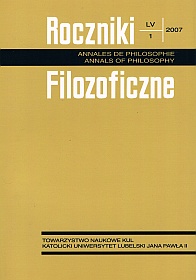O filozofii matematyki Imre Lakatosa
Abstrakt
The paper is concerned with Imre Lakatos’ philosophy of mathematics; it contains a presentation of Lakatos’ views and a critical analysis.
Lakatos formulates his conception on the basis of a case study – namely, the history of Euler’s hypothesis concerning polyhedrons. Differentiation of Euclidean and quasi-empirical theories depending on mechanisms of justification of the theses of a given science is crucial to Lakatos’ conception. Lakatos opposes the view according to which mathematics has a Euclidean character, i.e. it is created by deducing theorems from axioms. In mathematics we deal with the mechanism of formation of explaining hypotheses for basic propositions (which are propositions accepted in informal mathematics) and in this respect it reminds of empirical sciences.
The paper — apart from presenting Lakatos’ conception — also contains several critical remarks. I assert that the concept of arithmetic falsifier for multiplicity theory he introduced is not well justified. I prove the thesis that although examples on which Lakatos’ conception is based do have a historical value, they do not have any reference to contemporary mathematics. And finally I assert that it is doubtful if the way of presenting mathematical problems that Lakatos used can have a didactic value.
Bibliografia
Bassler O. B.2006: The surveyability of mathematical proof: a historical perspective, „Synthese” 148, 99-133.
Benacerraf P., Putnam H. (edd.)1964: Philosophy of Mathematics, Englewood Cliffs, NJ: Prentice-Hall.
Ernest P.1997: The legacy of Lakatos: reconceptualising the philosophy of mathematics, „Philosophia Mathematica” (3), 5, 116-134.
Fallis D. 2003: Intentional gaps in mathematical proofs, „Synthese” 134, 45-69.
Feferman S. 1978: The logic of mathematical discovery vs. the logical structure of mathematics, „Proceedings of the Biennial Meeting of the Philosophy of Science Association”, Vol. Two: Symposia and Invited Papers, 309-327
Feferman S. 2000: Why the programs for new axioms need to be questioned, „The Bulletin of Symbolic Logic” 6, 401-413.
Friedman H. 2000: Normal mathematics will need new axioms, „The Bulletin of Symbolic Logic” 6, 434-446.
Gödel K.1944: Russell’s Mathematical Logic, [w:] The philosophy of Bertrand Russell, (Library of Living philosophers, vol. 5), ed. P. A. Schlipp, La Salle, Ill.: Open Court Publishing Company, 123-153. Przedrukowane w: Benacerraf, Putnam 1964, 211-232
Gödel K. 1947/64: What is Cantor’s Continuum Problem?, „American Mathematical Monthly” 54, 515-525. W rozszerzonej wersji przedrukowane w: Benacerraf, Putnam 1964, 258-273.
Hallett M. 1979: Towards a theory of mathematical research programmes I & II, „British Journal for the Philosophy of Science” 30, 1-25, 135-159.
Hersh R. (ed.)2005: 18 Unconventional Essays on the Nature of Mathematics, New York: Springer.
Koetsier T. 1991: Lakatos’ philosophy of mathematics. A historical approach, Amsterdam–London–New York–Tokyo: North Holland.
Lakatos I.1976: Proofs and refutations. The Logic of mathematical discovery, Cambridge: Cambridge University Press. Przekład polski (na podstawie wydania z 1999, ed. J. Worral, E. Zahar): Dowody i refutacje. Logika odkrycia matematycznego, przeł. M. Kozłowski, K. Lipszyc, Warszawa: Tikkun 2005.
Lakatos I. 1978: A renaissance of empiricism in the recent philosophy of mathematics?, [w:] I. Lakatos, Philosophical Papers, t. 2: Mathematics, Science and Epistemology, ed. J. Worall, G. Currie, Cambridge: Cambridge University Press, 24-42. Przekład polski: Renesans empiryzmu we współczesnej filozofii matematyki?, [w:] Współczesna filozofia matematyki, red. R. Murawski, Warszawa: PWN 2002, 215-243.
Maddy P. 1988: Believing the axioms. I, „Journal of Symbolic Logic” 53, 481-511.
Maddy P. 1988a: Believing the axioms. II, „Journal of Symbolic Logic” 53, 736-764.
Maddy P. 1997: Naturalism in Mathematics, Oxford: Clarendon Press.
Maddy P. 2000: Does mathematics need new axioms?, „The Bulletin of Symbolic Logic” 6, 413-422.
Oliveri G. 2006: Mathematics as a quasi-empirical science, „Foundations of Science” 11, 41-79.
Panza M. 2003: Mathematical proofs, „Synthese” 134, 119-158.
Steel J. R. 2000: Mathematics needs new axioms, „The Bulletin of Symbolic Logic” 6, 422-433.
Tarski A. 2001: Podstawowe pojęcia metodologii nauk dedukcyjnych, [w:] Pisma logiczno- filozoficzne, t. 2, przeł. J. Zygmunt, Warszawa: PWN, 31-92.
Tymoczko T. 1986: New Directions in the philosophy of mathematics. An anthology, Boston–Basel–Stuttgart: Birkhauser.
Van Bendegem J. P. 1988: Non-Formal properties of real mathematical proofs, „Proceedings of the Biennial Meeting of the Philosophy of Science Association”, Vol. One: Contributed Papers, 249-254
Wójtowicz K. 2001: O tzw. programie Gödla, „Zagadnienia Filozoficzne w Nauce” 28-29, 100-117.
Wójtowicz K. 2002: O uzasadnianiu w matematyce, „Roczniki Filozoficzne” 50, z. 1, 527-551.
Wójtowicz K. 2006: Independence and justification in mathematics, [w:] Essays in Logic and Ontology: Dedicated to Jerzy Perzanowski, ed. J. Malinowski, A. Pietruszczak, (Poznań Studies in the Philosophy of Science and the Humanities, vol. 92), Amsterdam–Atlanta, GA: Rodopi, 349-373.
Copyright (c) 2007 Roczniki Filozoficzne

Utwór dostępny jest na licencji Creative Commons Uznanie autorstwa – Użycie niekomercyjne – Bez utworów zależnych 4.0 Międzynarodowe.





